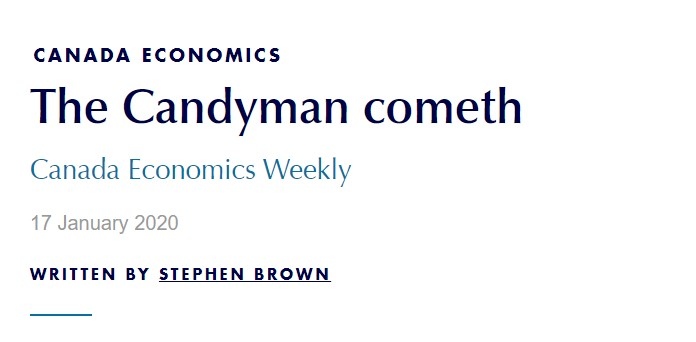Jan 17, 2020
Poloz weighs housing 'froth' as rate decision looms for Bank of Canada
By Greg Bonnell
Household debt, housing in focus ahead of Bank of Canada decision
When home prices heat up, speculators often get the real estate bug — a dynamic that can grow into a dilemma for the Bank of Canada as it watches for signs of “froth” in the market.
Governor Stephen Poloz heads into Wednesday’s rate decision with a Canadian housing rebound to throw into the monetary policy mix.
"Should this housing rebound continue, we will be watching for signs of extrapolative expectations returning to certain major housing markets — in other words, froth,” Poloz told a Vancouver audience earlier this month.
“It can be very unhealthy when the situation becomes speculative.”
And while the major housing markets aren’t exactly on fire like they were several years back, solid job growth, immigration and low interest rates are fueling a resurgence in key markets.
“I do think the Bank of Canada's concerns about froth in the market — in particular in the Greater Toronto Area — are warranted,” John Pasalis, president of Realosophy Realty, told BNN Bloomberg in an email.
“As we saw several years ago, markets can turn from balanced to frothy on a dime and given the tight conditions in the GTA market, it's important to assess if we see similar speculative behaviour driven by market psychology rather than market fundamentals.”
The market expects the Bank to hold rates steady on Wednesday. And while critics blame past rate cuts for inflaming home prices, the health of the housing market is not the bank’s mandate.
That would be low and stable inflation.
So with that in mind, BNN Bloomberg asked several of our regular guests how much the housing market will play into Bank of Canada’s rate decisions this year.
Here’s what they had to say:
“I still think [Poloz] is wary about the potential that the Bank might cause a renewed period of speculative housing activity in some parts of the country if it cut rates. The way I think about it is that it’s not a barrier to cutting rates per se, but rather a barrier to making small adjustments to policy like some other countries have done.
The Bank’s models are probably telling it that it should cut interest rates by 25 basis points, but in the grand scheme of things the effect of such a cut on GDP and inflation would be small. They have to trade that small benefit against the risk that they cause a renewed period of speculative activity in the housing market.”
—Stephen Brown, senior Canada economist, Capital Economics. Brown made BNN Bloomberg’s Andrew Bell the star attraction in his own preview note to clients Friday, citing an unforgettable exchange last month.
“No one should underestimate the BoC's laser focus on its most vital responsibility. The Bank's mandate ensures that its 18-to-24 month inflation projections override virtually all other considerations.
It's highly unlikely that housing strength would keep the BoC from stimulating the economy if inflation expectations started plummeting. Sufficient economic firewalls are in place. Macroprudential policy is one of them. The government's mortgage stress tests, default insurance restrictions and stricter capital rules all serve to lower the risk of BoC policy exacerbating housing instability.”
—Rob McLister, founder, RateSpy
“Short answer, yes, it’s a dilemma — but a few things:
• The strong jump in home prices in places like the GTA in the third quarter is probably unsustainable (due to pent up demand in the past few quarters). So it’s possible the housing inflation will moderate and will make the BoC’s life a bit easier.
• B-20 (the mortgage stress test) is still around and acts as a negative.
• The (Bank of Canada’s posted) five-year rate went up notably, a negative.
• And a 25-basis-point cut by the Bank will not impact the five-year rate much and will have little impact on borrowing costs.
I think that given all the above, the housing market will probably not prevent the bank from moving, by say 25 basis points, if they believe that will prevent, say, a dollar appreciation.”
—Benjamin Tal, deputy chief economist, CIBC Capital Markets
“The BoC is painted into a corner of sorts. All signs are that the next change in rates is likely to be a cut and while the broader economy may eventually need that, the BoC recognizes how a rate cut can impact speculative buying in the housing market.
It's going to be a challenge to balance these different priorities - lower rates to improve our overall economy knowing that it can present even more risks to our housing market and household debt in the future.”
—John Pasalis, president, Realosophy Realty




